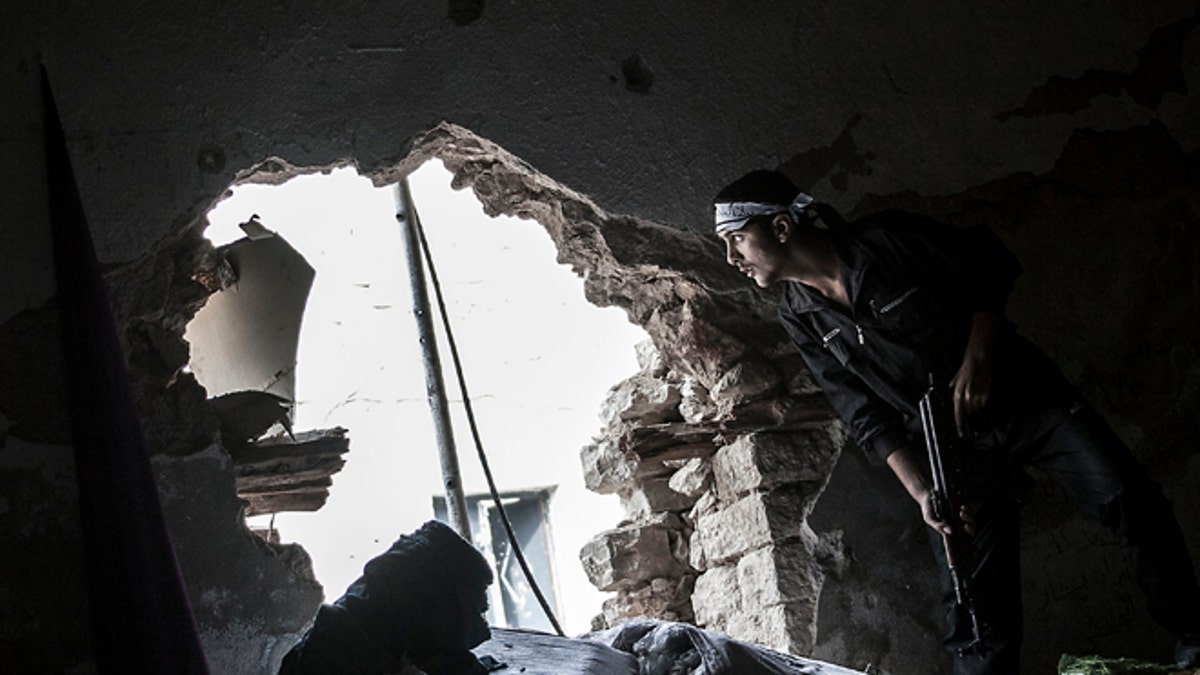
Oct. 24, 2012 photo: A Free Syrian Army fighter watches over an enemy position as rebel fighters belonging to the Liwa Al Tawhid group carry out a military operation at the Moaskar front line, one of the battlefields in the Karmal Jabl neighborhood, in Aleppo, Syria. (AP)
BEIRUT – Fighting raged near a military base in Syria's north as a cease-fire in the bloody civil war was supposed to go into effect Friday at dawn, activists said, illustrating the difficulty of enforcing even a limited truce coinciding with a Muslim holiday.
Elsewhere, violence appeared to die down, and thousands of protesters took advantage of the lull to mount some of the largest anti-regime demonstrations in months.
The truce, proposed by U.N.-Arab League envoy Lakhdar Brahimi and endorsed by the Security Council, is set for only the four days of the Eid al-Adha holiday, has no monitoring mechanism and no stated plans for its aftermath.
The first serious disruption involved a radical Islamic group, Jabhat al-Nusra, that rejected the cease-fire from the outset. The group clashed Friday with regime forces for control of a military base outside of a strategic town on the road to the northern city of Aleppo, according to the Britain-based Syrian Observatory for Human Rights, which relies on a network of activists.
Fierce fighting has been going on there for several days.
Opposition fighters seized Maaret al-Numan, which lies along the main highway between Aleppo and Damascus, earlier this month. Their presence has disrupted the ability of the Syrian army to send supplies and reinforcements to the northwest, where troops are bogged down in a stalemate with the rebels in Aleppo, Syria's largest city.
The latest fighting showed the complexity of the situation, with the badly fragmented opposition sending mixed signals about the truce, some endorsing it but others rejecting it as irrelevant.
President Bashar Assad's government accepted the truce but left significant loopholes, declaring it would respond to any rebel attack or attempts by foreign forces to intervene.
Also Friday, the army fired artillery shells in several areas, including in Aleppo and suburbs of Damascus, but overall the level of fighting appeared to drop significantly.
If the truce holds, it would be the first actual halt in 19 months of fighting that began with mass demonstrations but has transformed into a full-blown civil war with sectarian overtones and tens of thousands of dead.
Earlier attempts by mediators to bring about a cease-fire failed, though elements of both sides had accepted truce proposals.
The Observatory said protesters rallied after holiday prayers in Aleppo, in central province of Homs and the city of Hama. Demonstrators also took to the streets in the suburbs of Damascus, and across the southern province of Deraa, where the uprising began. Three people were wounded when troops tried to disperse protesters in Deraa, the group said.
Activists said three people were killed in shelling of the Damascus suburb of Harasta and two people died as a result of sniper fire. There were no reports of clashes or protests at the time of the attacks, the Observatory said.
The demonstrations were reminiscent of the mass protests that ignited the civil war. In recent months, gatherings have been smaller, a result of a brutal crackdown by the Assad regime.
More than 35,000 people have been killed, including more than 8,000 government troops, since the uprising against Assad began in March 2011, according to activists.
The Observatory said overnight clashes between troops and rebels took place in Homs, in Deir el-Zour in the country's east and in the city of Aleppo, the country's largest. At least seven people were killed in the fighting, including three rebels, the group said. Six soldiers were wounded.
On Thursday, rebels claimed major gains in the key battleground of Aleppo, Syria's commercial hub, pushing into predominantly Christian and Kurdish neighborhoods that had previously been held by pro-Assad forces in northern part of the city.
The short holiday cease-fire was all a divided international community could agree on after the failure of a more ambitious plan for an open-ended truce and political transition talks by Brahimi's predecessor, former U.N. chief Kofi Annan, in April.
Brahimi has not said what was supposed to happen after four days, an ominous sign, since Assad and opposition leaders disagree sharply on how to proceed. Assad refuses to resign, while some opposition leaders say his departure is a prerequisite for any political talks. The fragmented opposition factions disagree over whether to negotiate with Assad at all.
